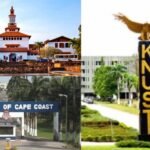President John Dramani Mahama has lamented the growing number of Ghanaian students who are unable to pursue tertiary education due to financial constraints, describing each case as “a dream deferred.”
Speaking at the official launch of the No Fees Stress policy in Koforidua on Friday, July 4, the President drew attention to the human cost behind the statistics of students unable to enrol in or complete tertiary education due to the inability to pay academic-related fees.
“Far too many of our young people have worked hard, passed their exams, and earned a place in our tertiary institutions, only to be turned away because their families cannot afford the upfront fees,” he said. “These are not just statistics. Behind each number is a name, a face, a dream deferred.”
The No Fees Stress policy, officially launched by President Mahama on Friday, is a new government initiative that will cover academic-related fees for all first-year students admitted to public tertiary institutions, including universities, colleges of education, technical universities, and nursing training institutions.
According to the President, over 150,000 students were admitted into public tertiary institutions during the 2022/2023 academic year, yet thousands could not take up the opportunity due to cost barriers. He cited figures showing that while students in colleges of education and nursing training received monthly allowances of GHS 200, they were required to pay admission fees ranging from GHS 1,362 to GHS 2,340.
In many cases, he said, these fees are demanded before students have the chance to register for the Student Loan Scheme.
President Mahama emphasised that the new policy is not a welfare programme, but rather an equity-based intervention rooted in constitutional obligation and the country’s developmental needs.
“This policy is not about welfare. It is about fairness,” he stated. “It is about restoring dignity to the Ghanaian student. It is about affirming that the right to education is not a privilege for the wealthy, but a shared national inheritance.”
The President stressed the transformative power of tertiary education, calling it “the engine that powers a modern society,” and cited World Bank data showing that each additional year of tertiary education can increase an individual’s earnings by up to 17% in developing countries.

He noted that only 18% of Ghanaians aged 18 and above have completed tertiary education, according to the 2021 Population and Housing Census. “In a nation striving to build a resilient, knowledge-driven economy, this gap is one we cannot afford to maintain,” he said.
READ: Mahama launches ‘No Fees Stress’ policy to remove tertiary education barriers
The No Fees Stress policy also includes:
- A restructured Student Loan Plus scheme with expanded eligibility and simplified access;
- Free tertiary education for persons with disabilities;
- Increased student loan amounts adjusted annually;
- Targeted scholarships for underrepresented communities and critical national disciplines;
- Reimbursement of up to GHS 2,500 for students in fee-paying programmes without regular-track equivalents.
“As we speak, academic user fees have been cleared for an initial 15,000 students under this policy,” President Mahama disclosed.

He concluded with a strong commitment to building a society where access to higher education is based on merit, not wealth:
“We are building a Ghana where opportunity is not inherited but created. A Ghana where education is not rationed by class or cash, but granted by merit and upheld by the collective will of the Republic.”

Source: Starrfm.com.gh




